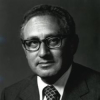Henry A. Kissinger

Henry A. Kissinger
Henry Alfred Kissingeris an American diplomat and political scientist. He served as National Security Advisor and later concurrently as United States Secretary of State in the administrations of presidents Richard Nixon and Gerald Ford. For his actions negotiating the ceasefire in Vietnam, Kissinger received the 1973 Nobel Peace Prize under controversial circumstances, with two members of the committee resigning in protest. Kissinger later sought, unsuccessfully, to return the prize. After his term, his advice has been sought by world leaders...
NationalityGerman
ProfessionStatesman
Date of Birth27 May 1923
CountryGermany
If I should ever be captured, I want no negotiation - and if I should request a negotiation from captivity they should consider that a sign of duress.
It was a Greek tragedy. Nixon was fulfilling his own nature. Once it started it could not end otherwise.
Blessed are the people whose leaders can look destiny in the eye without flinching but also without attempting to play God.
In my view, there's no doubt that the Soviets had infinitely greater trouble holding their structure together than we did.
The statesman's duty is to bridge the gap between his nation's experience and his vision.
People are generally amazed that I would take an interest in any form that would require me to stop talking for three hours.
The American temptation is to believe that foreign policy is a subdivision of psychiatry.
Our problem was that in the American approach to Soviet affairs policy has oscillated between people who take an essentially psychological approach and people who take an essentially theological approach, and the two really meet. The psychologists try to "understand" the Soviet Union. And try to ease its alleged fears. The theologians say the Soviets are evil.
No foreign policy - no matter how ingenious - has any chance of success if it is born in the minds of a few and carried in the hearts of none.
In crises the most daring course is often safest.
For other nations, utopia is a blessed past never to be recovered; for Americans it is just beyond the horizon.
In a diplomatic negotiation, you always meet the same the other side all the time. Even if you should succeed in outsmarting him or in pressuring him, it only sets up a cycle in which he will try to get even.
While we should never give up our principles, we must also realize that we cannot maintain our principles unless we survive.
No country can act wisely simultaneously in every part of the globe at every moment of time.